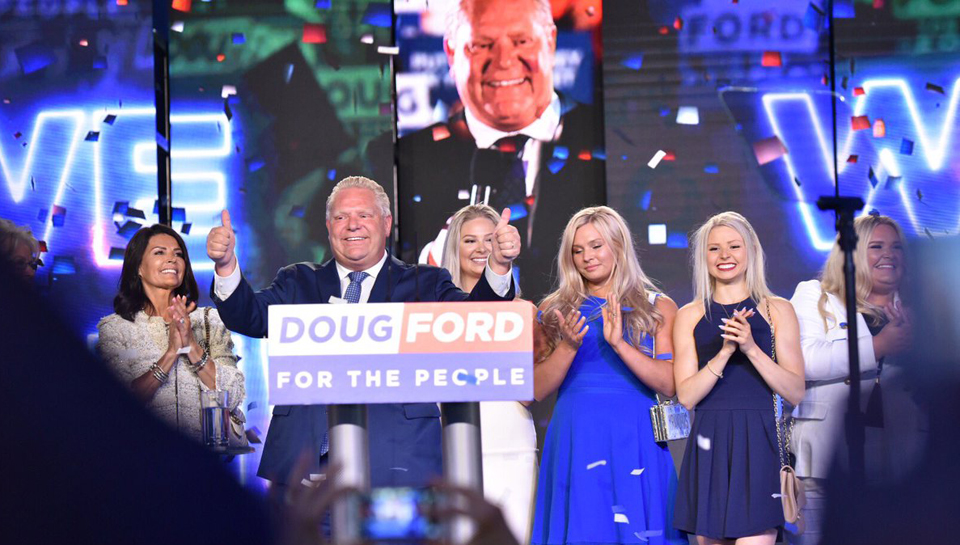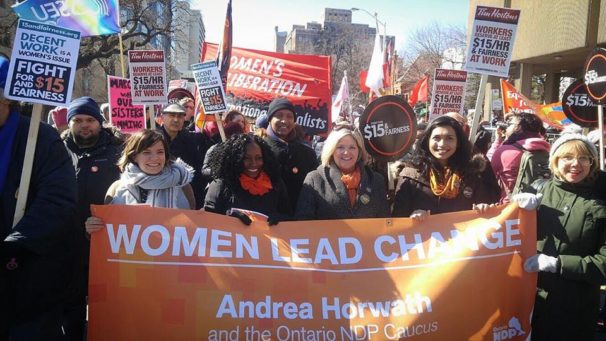
TORONTO—Beer in Ontario, Canada’s largest province, will soon be $1 again now that Conservative Doug Ford has been elected premier. Cheap booze was one of the major campaign promises made by the right-wing populist leader during the provincial election, which wrapped up Thursday night with a decisive victory for his party.
Others included cheaper gas, cheaper electricity, no more sex-ed in school classrooms, an end to carbon cap-and-trade measures, and tax cuts for almost everyone. In a grand performance that would have made his late brother Rob (the former Toronto mayor of cocaine fame) proud, Doug handily sailed to power presenting himself as a “Man of the People.”
The “people” his government will likely serve was readily apparent from his victory speech, however, when he declared, “Ontario is open for business.” Alongside the treats that he promised the masses, the other big components of Ford’s plan include cuts to the corporate tax rate, the lifting of restrictions on resource development in Ontario’s north, and the cancellation of a planned minimum wage increase.
The excitement in the business community was open and enthusiastic. Ford’s big win had Rocco Rossi, head of the provincial Chamber of Commerce, “looking forward to working with the PC Government,” referring to the party’s official name (and misnomer), Progressive Conservative. The CEO of the small business federation, Dan Kelly, said that the big takeaway from the election was that “governments that cave into every demand from union bosses” can’t expect to always win at the polls.
The giddiness of employers about the new Ford government was matched by a sense of dread on the part of labor. Fred Hahn, president of the Ontario branch of the Canadian Union of Public Employees, said “The people of Ontario cannot afford a Doug Ford government…. It might work for the richest among us, but definitely not for working people and our families.”
An analysis of Ford’s major fiscal proposals and their likely impact by economist Toby Sanger of the Canadian Center for Policy Alternatives calculated that direct net job losses could reach as high as 135,000 by the end of his mandate. Ford’s pledges to cut tax revenues by $7.6 billion annually and public spending by $500 million a year while also balancing the budget don’t add up, according to Sanger. He predicts it will be impossible for Ford to meet his deficit elimination promise without inflicting even more public spending cuts and layoffs.
Hahn said, “Ford likes to tell people he knows how to manage the economy, but his reckless tax cut plan guarantees that thousands of people are going to lose their jobs.”
CUPE and several other unions endorsed the New Democratic Party, Canada’s traditionally left-wing, labor-backed party. Several teachers’ unions, notably the 81,000-member-strong Elementary Teachers Federation of Ontario, backed away from the governing Liberal Party for the first time in years and pushed for an NDP vote.
The Ontario Steelworkers (USW), which are reeling from the steep steel and aluminum tariffs introduced by U.S. President Donald Trump, also came out strongly in favor of the NDP. The party’s leader, Andrea Horwath, hails from the city of Hamilton, heart of Canada’s steel industry.
Though Ford was victorious, the NDP scored its best results in a generation, coming second place and securing Official Opposition status. It ran on an explicitly social democratic platform, pledging to expand the province’s public health care system to include prescription drugs and dental coverage, return the recently privatized Hydro One electricity company to public ownership, convert all student loans to grants, and raise the corporate tax rate.
Ken Neumann, USW National Director in Canada, said that only the NDP had “a plan for universal pharmacare and dental care that will benefit all workers,” and that it was the only major party “on the side of workers and communities.” Six Steelworkers ran as NDP candidates, with five winning seats.
While Ford’s Progressive Conservatives and the New Democrats both had strong performances, the centrist Liberal Party that has governed Ontario for 15 years was completely decimated. It went from a majority government to just seven seats, with party leader Kathleen Wynne barely holding onto her own.
She headed a party plagued by public spending scandals inherited from a predecessor and was unpopular, at least in part, over her decision to privatize the provincial electric supplier, which went on to pay huge salaries to its executives. Although the Wynne Liberals had implemented many measures taken from the NDP’s usual platform—raising the minimum wage to $15, more union-friendly labor laws, free prescription drugs for anyone under 25, and free tuition for lower- and middle-income students—it was impossible to overcome the sense (largely promoted by its endless repetition in the media) that the time had come for change.

With the handwriting clearly on the wall, Wynne made a stunning concession speech the weekend before voters even went to the polls.
Ford won a strong majority, with 76 out of 124 seats compared to the NDP’s 40, but Canada’s first-past-the-post election system distorted the results. Nearly 60 percent of voters actually cast ballots for one of the anti-Ford parties, and if the proportional representation system debated here for years had been in place, an NDP-Liberal coalition government would have been the likely result.
Ford translated his minority support into a majority victory, though, with targeted appeals and an efficient geographic strategy. He deployed his “little guy” populist rhetoric to score points with rural and some working class constituencies in the so-called “Ford Nation,” while relying on promises of tax and spending cuts to lock down the wealthier suburbs that surround Toronto.
Neither revelations that Ford himself was involved in selling fake Progressive Conservative Party memberships to get candidates nominated nor an election-eve lawsuit from his brother Rob’s widow over family finances were enough to derail the candidate.
Ford will assume office in three weeks’ time. With a majority government, he could begin implementing his agenda quite quickly. A promised audit of provincial finances is expected to be among the first orders of business and will likely set the stage for claims that the government is in even worse shape than expected and that further cuts will be required.
Once Ford gets to work and people begin to see what they are in for, the $1 beer may come in handy after all.












Comments